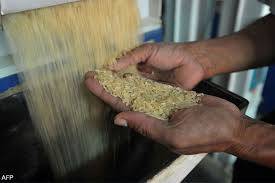LAHORE - The Punjab government is launching an ambitious over Rs6 billion project to promote mechanisation, usage of certified seed and responsible application of pesticides in accordance with the quantity prescribed by the agricultural experts.
“Under this project, farmers will be given 50 per cent subsidy on purchase of certified rice seed. The department is pre-qualifying the seed companies in this regard. It is a complete package being given by the government to enhance the productivity of the rice sector”, said Director Agriculture (Extension) Gujranwala Javed Iqbal while speaking at a memorandum of understanding (MoU) signing ceremony.
“The project is also aimed at to promote the use of transplanters for increasing plant population in rice fields and extending subsidy on other agricultural implements”, he said.
Syngenta Pakistan and Atlas Foods (Pvt) Limited signed the said MoU) to impart training to rice growers regarding the need-based application of pesticides. The training will create awareness among the farmers to avoid excessive usage of pesticide.
Managing Director Syngenta Pakistan Kazim Hasnain and CEO Atlas Foods Sami Ullah Naeem inked the document on behalf of their respective organizations.
Dr Javed Iqbal said that the government would bear 50 per cent of the cost on the usage of different types of machinery such as transplanters, nursery raising machines, DSR-drill, rice straw choppers, rotavators and power sprayers. “It is aimed at to convert this sector from the present status of tractorization into real mechanization,” he added.
Sami Ullah Naeem said that 55 per cent of Pakistan’s economy was dependent on agriculture and rice crop was one of the most important crops, which was earning precious foreign exchange for the country. He said that monitoring of pesticides residue in rice crop had increased by the European Union (EU), USA and Saudi Arabia for the last three to four years. He said that product was going to the high-end market and there was need to keep the pesticide residue at their required level. He said, unfortunately, pesticide residue in rice crop in Punjab was high as compared to Sindh. “This is why paddy of Sindh is getting more price than Punjab”, he said, adding, the provincial agriculture department has divided the Punjab province into Red, Blue and Green zones to highlight where pesticide residue was high and needed to control it. “We have to stop wrong and excessive use of pesticides as it is also harmful for the growers”, he said.
Head Crop Protection Syngenta Pakistan Andre Oliveira and Business Sustainability & CPD Head Syngenta Muhammad Tuseef ul Haq while speaking on this occasion disclosed that their company was training 400,000 farmers per annum on a balanced use of pesticides. They disclosed that their company invests US$ 1.3 per annum million in research and development. They said that they were committed to bringing more products to ensure the sustainability of the agricultural sector with a focus on better and safe products.






